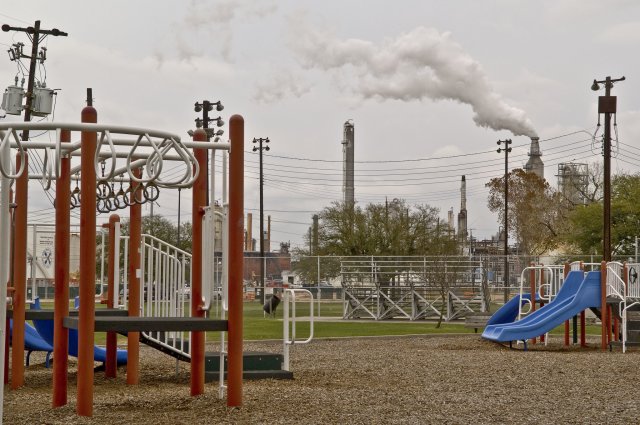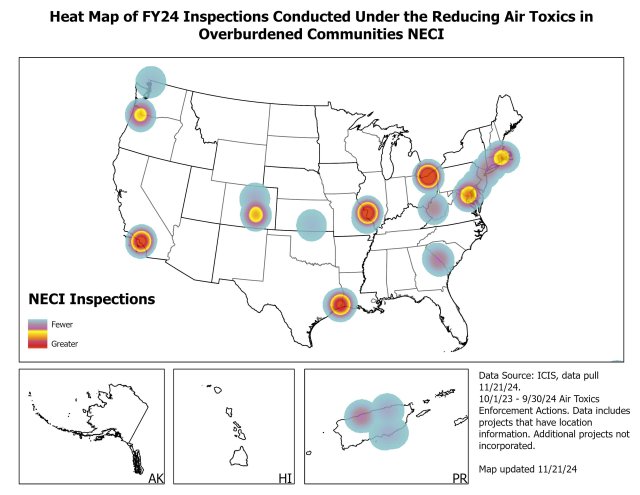National Enforcement and Compliance Initiative: Reducing Air Toxics in Overburdened Communities
Problem

EPA is committed to reducing air pollution in communities across the country, especially in overburdened communities that suffer disproportionate impacts from higher levels or multiple sources of toxic air pollution, including hazardous air pollutants or HAPs. People exposed to HAPs at sufficient concentrations and durations may have an increased chance of getting cancer or experiencing other serious health effects. These health effects can include damage to the immune system, as well as neurological, reproductive (e.g., reduced fertility), developmental, respiratory and other health problems. In addition to exposure from breathing air toxics, some toxic air pollutants such as mercury can deposit onto soils or surface waters, where they are taken up by plants and ingested by animals and are eventually magnified up through the food chain.
Goals
The Reducing Air Toxics in Overburdened Community National Enforcement and Compliance Initiative or NECI aims to provide cleaner air to overburdened communities harmed by polluters that violate the Clean Air Act’s air toxics regulations. These regulations are specifically designed to protect public health and reduce exposure to toxic air emissions.
In fiscal year (FY) 2024, the 10 EPA Regions identified overburdened communities and developed strategies to identify pollution sources of concern in those communities. The Regions are investigating these sources for any noncompliance and bringing enforcement actions as necessary.
FY 2024 Results:
In the first year of implementing this initiative, the 10 EPA regional offices identified 27 overburdened communities of focus.
In carrying out this work, EPA increased its transparency, communication, and engagement with the communities through holding public meetings, posting public information on EPA websites, and making monitoring data more widely available as appropriate.
Inspections
In FY 2024, EPA utilized advanced monitoring tools to identify inspection targets and conducted over 184 inspections in the communities of focus.
The map shows the location of inspections in the communities of focus. The brighter the color of an area, the more inspections that have taken place in that area.

Enforcement Cases
In FY 2024, EPA concluded eight enforcement actions, which have collectively reduced almost 1.3 million pounds per year of volatile organic compounds or VOCs and 190 thousand pounds per year of HAPs. Enforcement highlights include:
Best Petroleum: In January 2024, EPA reached a settlement agreement with Best Petroleum Corp. for the company’s failure to properly operate and maintain control equipment at a gasoline storage and loading facility in Guaynabo, Puerto Rico. Best Petroleum paid a penalty of $316,721. The settlement reduces more than one million pounds per year of VOCs, some of which are HAPs such as benzene, toluene, ethylbenzene, and xylene. As a result of EPA’s action, the company undertook extensive upgrades to its gasoline vapor recovery unit, installed new emission monitoring equipment, and repaired damaged pollution control equipment at its internal and external floating roof gasoline storage tanks. (Read the Best Petroleum Corp. Will Conduct Enhanced Monitoring to resolve CAA violations press release)
Petroleum Recovery and Remediation Management, Inc. (PMI): In April 2024, EPA finalized a settlement with PMI, an oil recycling facility located in Baltimore, Maryland, for Clean Air Act violations related to processing, recycling, and disposal of waste oil material, including the operation of bulk storage tanks. PMI paid a penalty of $230,000. The settlement reduces more than 222 thousand pounds per year of VOCs and 190 thousand pounds per year of HAPs such as benzene, toluene, ethylbenzene, and xylenes. (Read EPA fines PMI for Violations of CAA press release)
East Side Plating (ESP): In March 2024, EPA finalized a settlement agreement with East Side Plating (ESP), a nickel-plating company in Portland, OR, for failure to install controls on several nickel-plating tanks and to maintain and submit reports. ESP paid a penalty of $139,505. As a result of EPA’s action, ESP has installed the required lids on the plating tanks, thereby reducing harmful nickel emissions. (Read the In the Matter of East Side Plating Consent Agreement)
Intalco Aluminum LLC: In July 2024, the United States, filed a Stipulation of settlement resolving extensive Clean Air Act violations by Intalco at its former aluminum smelter in Ferndale, Washington. Intalco failed to maintain and operate air pollution control systems and exceeded emission limits. In addition, Intalco failed to comply with monitoring requirements, work practice standards, and recordkeeping and reporting requirements. Intalco opted for the smelter to become fully idle in October 2020 and announced permanent closure in March 2023. As a result of the settlement, Intalco surrendered its Clean Air Act Title V Air Operating Permit and paid a penalty of $5,250,000. (Read the Intalco Settlement for major CAA violations press release)
Community Awareness and Training
In addition to casework, EPA also is enhancing communication with communities about air enforcement actions through meetings, trainings, publicly available information on EPA websites. EPA is working to empower communities to:
- Engage with EPA
- Communicate concerns to EPA, and
- Become more involved in helping identify and address air pollution.
To encourage information sharing, some EPA regional offices are developing community specific websites to increase community awareness about EPA’s enforcement actions and to provide easy access to final enforcement documents.
EPA is delivering training to help communities become more familiar with EPA’s authorities and its enforcement and compliance assurance activities focused on protecting human health and the environment by reducing air pollution. An example of this effort is an Introductory Environmental Enforcement Training Webinar developed for Augusta, Georgia to share information about EPA’s enforcement work in the community and explain ways the community can have greater input into EPA’s efforts to uncover and resolve Clean Air Act violations.
